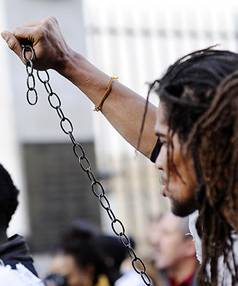 CATHERINE HORNBY, REUTERS
CATHERINE HORNBY, REUTERS
CHAINS: US Ambassador-at-Large Luis CdeBaca is calling on the countries of the world to take a harder stance on human slavery.
Up to 27 million people are modern-day slaves, and migrants fleeing violence in North Africa are among those most at risk of being exploited, a senior US official said on Wednesday.
Countries where migrants arrive should try to identify potential victims and protect them, rather than opting for immediate repatriation which often sends them back into the hands of human traffickers, US Ambassador-at-Large Luis CdeBaca said.
Tens of thousands of migrants are fleeing turmoil in North Africa, with many trying to reach Europe by boat, but the problem of slavery exists all over the world and India, Thailand and Malaysia are among the worst-affected countries.
The European Union has urged African border authorities to bolster controls to prevent human smugglers taking advantage of the situation.
But CdeBaca, who directs the US Department of State's Office to Monitor and Combat Trafficking in Persons, said it was more effective to fight slavery in the countries where the victims are exploited.
"You don't fight trafficking on the borders, because people don't yet know they are trafficking victims, it's only when they get to where they are going that they are enslaved," he said at a conference organised by the US embassy to the Vatican.
"People should be keeping an eye on where these refugees end up, what kind of jobs they are being put into and how they are being treated," he said.
He estimated between 12.5 and 27 million people are trapped in slavery around the world, ranging from children forced to work as domestic servants or in sweatshops to women coerced into prostitution.
Speakers at the conference stressed the need for more cooperation between governments, companies and religious groups to prevent more people from falling victim to the slave trade.
"The criminal organisations that prey on men, women and children are highly organised and well connected from one part of the world to the other," said Sister Estrella Castalone, who co-ordinates anti-trafficking group Talitha Kum.
"It is only through an equally well organised network that links the countries of origin to those of transit and destination, that we can prevent the weakest and the most vulnerable from becoming a human commodity."
The Interfaith Center on Corporate Responsibility said it was pressing businesses to scrutinise their supply chains and ensure their labour contracts included clear language to prevent human trafficking.
It called for more public reporting on the measures firms are taking to fight slavery.
END
Baroness Goudie attended and gave support to Ambassador Luis CdeBaca. John Bedford, Deputy Head to the British Embassy to see the Holy See was also in attendance. Baroness Goudie emphasised that we need the faith groups to join civil society and the public and private sectors to fight against human slavery.
